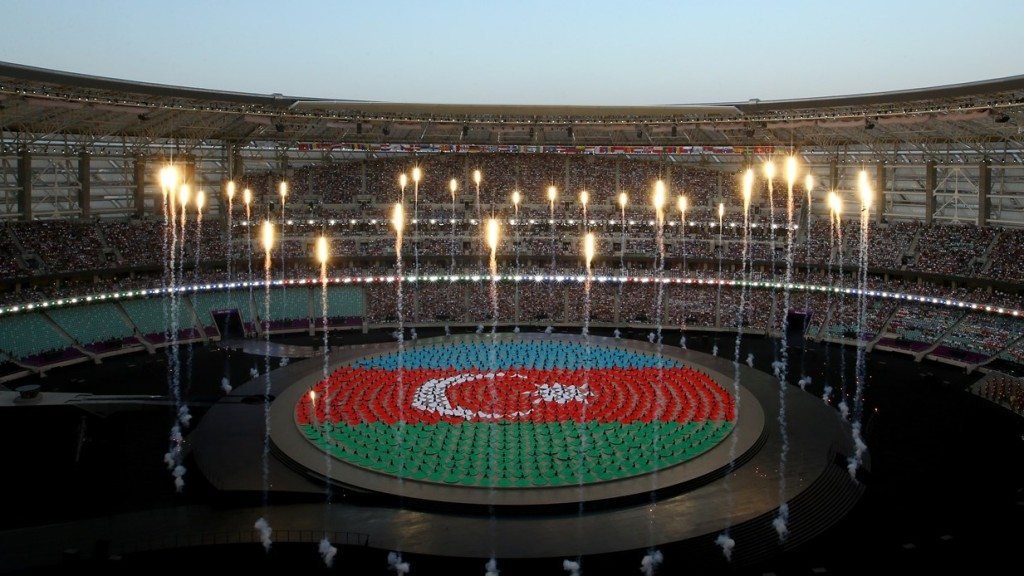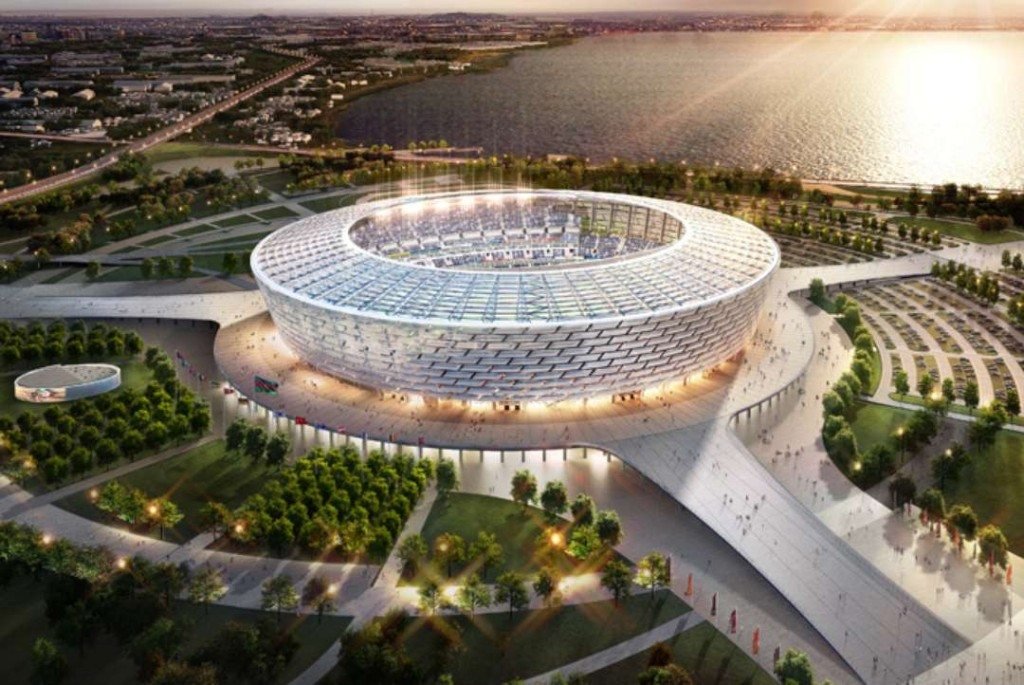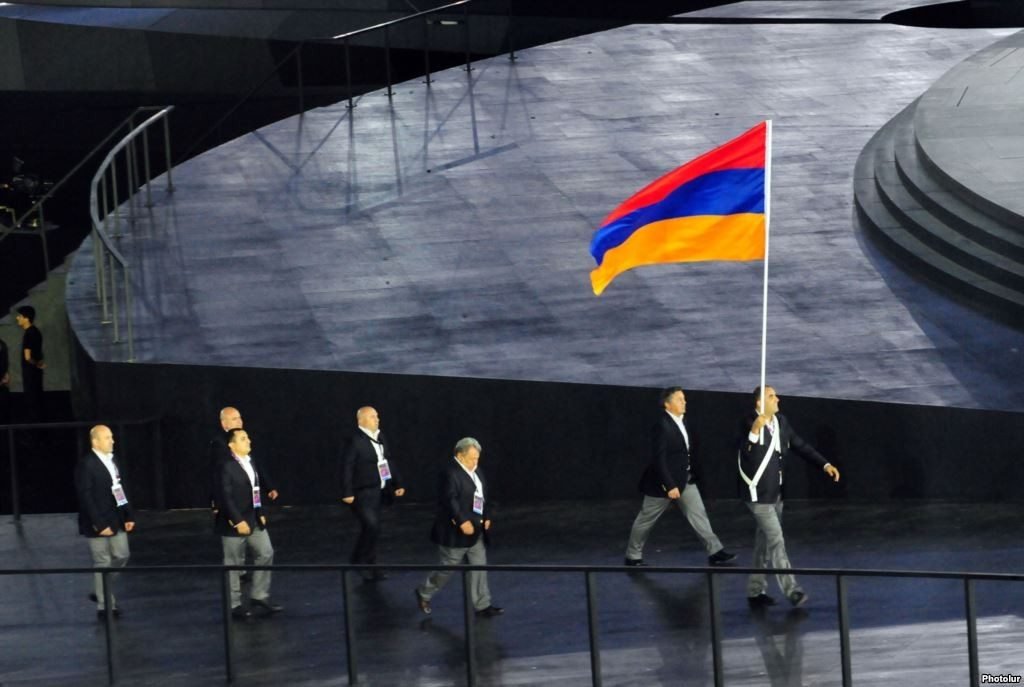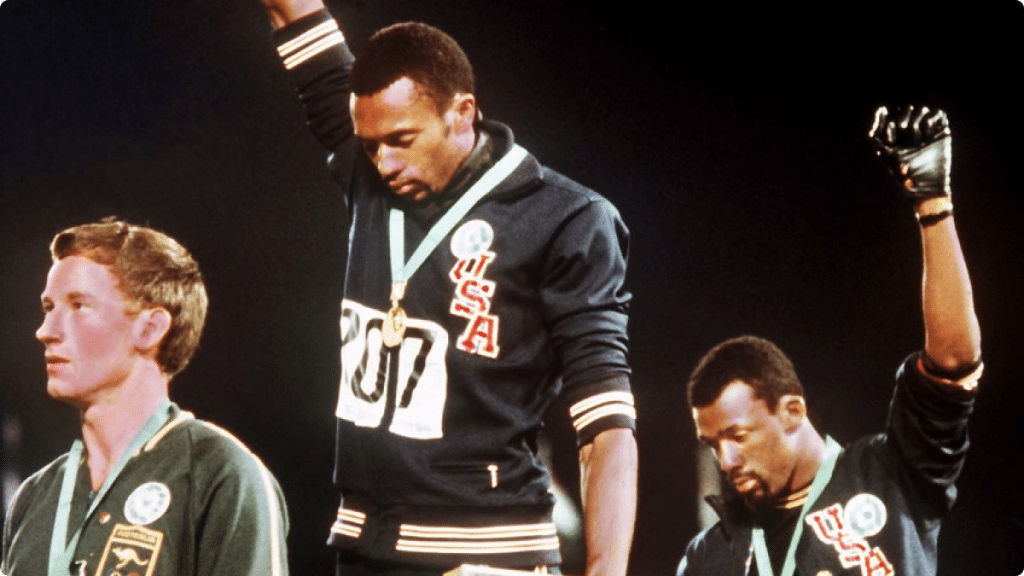Special for the Armenian Weekly
“This is the proudest moment in the history of the European Olympic Committees.” European Olympic Committees (EOC) President Patrick Hickey’s remarks at the opening ceremonies of the inaugural European Games in Baku were brief; after all, he had to share the stage with some serious star power. In a lavish two-hour production of colors and sounds, which included a surprise performance by six-time Grammy Award winner Lady Gaga, the stage was set for what many are dubbing Baku’s “coming out parade”—a no-expense-spared, extravagant attempt to put Azerbaijan on the map.

But right from the start, it was obvious that the games, taking place June 12-28, would be filled with controversy and steeped in scandal.
Baku’s Bid to Host
Although the idea of the European Games had been floating around for years, it wasn’t until the 2012 International Olympic Committee (IOC) Congress in Rome that the decision was made to go ahead with the multi-sport competition—the final continental Games to be initiated, after the Asian Games, Pan-American Games, All-Africa Games, and Pacific Games.
It is believed that Hickey had been hunting for a potential host country, and first approached Azerbaijan while attending the 2012 Eurovision Song Contest, which took place in Baku. Even though both Turkey and Russia were widely believed to be the top choices to play host in 2015, Azerbaijan was, in fact, the only nation to make an official bid.
The decision to award the Games to Baku was made by secret ballot, during which out of 48 votes, 38 were in favor of the lone bidder. Ignoring Azerbaijan’s dismal track record of human rights violations and the country’s ongoing aggression towards its neighbors, the National Olympic Committees (NOCs) were convinced that Baku would be the perfect host after they were assured that they would not suffer any financial losses from the inaugural event. The Azerbaijani organizing committee would be footing the bill for the more than 6,000 athletes from 50 competing countries.
The Aliyevs: A Family Affair
The organizing committee responsible for the Baku Games was formed by a decree from Azerbaijan’s increasingly autocratic president, Ilham Aliyev, who also serves as the president of the National Olympic Committee of Azerbaijan. The committee is chaired by First Lady Mehriban Aliyeva, who is also a member of the executive committee of the NOC of Azerbaijan. In what has been called a “family affair,” the Aliyevs’ mission has been to spend as much money as possible, so that the Baku Games “showcase Azerbaijan as a vibrant and modern European nation of great achievement.”
Officially, the Games have a price-tag of about $1.5 billion (USD), but many have speculated that the actual cost is well over $10 billion, when the expenses for infrastructure are added in. The 68,000-seat Baku Olympic Stadium alone (where the lavish opening ceremonies took place) cost in excess of $650 million.
The Aliyev regime has used the enormous revenues from Azerbaijan’s oil and gas fields to finance the grand affair, and hired several international corporations to help coordinate, among them the British oil company BP, which is also one of eight official partners of the Baku 2015 Games.
BP’s relationship with the oil-rich country goes back to the early days of Azerbaijan’s independence. The company’s first office in Baku opened back in 1992. Only two years later, the BP-led consortium of international oil companies signed a major contract with the government of Azerbaijan in what is generally believed to be the deal that provided President Aliyev’s father and predecessor, Heydar Aliyev, considerable power and money, which helped expand the oppressive regime’s stronghold on the country.

Over the years, Azerbaijan’s oil wealth has somehow made it to the bank accounts of President Aliyev and the rest of the Aliyev family, making them quite wealthy. According to documents discovered by the Organized Crime and Corruption Reporting Project (OCCRP), the Aliyev family has more than $3 billon in at least 8 Azerbaijani banks. Their overall assets are estimated to be much higher, though, with much of their wealth invested outside of the country.
Back in 2010, Aliyev’s son, Heydar Jr., allegedly spent about $44 million on 9 waterfront mansions in Dubai. He was only 11 years old at the time.
The reality in Azerbaijan is far grimmer than what Aliyev’s extravagance hopes to project.
Hostility: At Home and Abroad
On June 9, only three days before the opening of the Games, the global human rights organization Amnesty International was told that it was not welcome in Baku. Two days later, the British daily newspaper the Guardian, as well as several other media outlets and human rights activists, were barred from entering the country.
Independent bodies, including Amnesty International and Human Rights Watch, have frequently criticized and condemned the government of Azerbaijan for its human rights record. According to an August 2014 report by Amnesty International, “The persecution of human rights activists continues unabated in Azerbaijan, in spite of the obligations the country committed to as a member of Council of Europe and currently a chair of its decision-making body, the Committee of Ministers.”
Freedom of expression, assembly, and association continues to drastically deteriorate year after year under the Aliyev regime. Violations in elections, the rise of corruption, and politically motivated prosecutions, as well as a severe lack of freedom of the press, has made Azerbaijan among the world’s biggest violators of basic human rights.
While Azerbaijani authorities may boast that independent news outlets exist in the country, journalists who speak out against the current regime are harassed, assaulted, issued travel bans, and often imprisoned. In 2014 alone, at least 36 journalists, activists, human rights advocates, and critics of the government were imprisoned on trumped-up charges. Among them was Intigam Aliyev, a human rights lawyer who was sentenced to 7.5 years on exaggerated charges of tax evasion, and Khadija Ismayilova, an investigative journalist probing the corruption record of Aliyev’s family. The latest Press Freedom Index published by Reporters Without Borders ranked the country 160 out of a total of 180 nations.
Azerbaijan’s hostility has not been limited to domestic issues. The Aliyev government has also actively continued a policy of aggression against Armenians—from exile and pogroms in the late 1980’s, to the constant war-mongering rhetoric threatening to end the cease-fire with the Nagorno-Karabagh Republic. Moreover, Azerbaijan has been taking active steps towards erasing the memory of Armenians from their country, including the planned destruction of Armenian khatchkars (cross-stones) in the Nakhichevan region in 2005.
Recently, on June 4, the Organization for Security and Cooperation in Europe (OSCE) announced that the Azerbaijani Foreign Ministry gave them a month to shut down their local office. The OSCE Minsk Group was created in 1992 by the Conference on Security and Cooperation in Europe to encourage a peaceful, negotiated resolution to the Karabagh conflict. Azerbaijani authorities had long distrusted the OSCE and its Minsk Group, claiming that the three co-chair countries of the group (Russia, France, and the United States) have large Armenian Diasporan communities and have always favored Armenians in the conflict. Nonetheless, the OSCE Minsk Group remains the only internationally mandated format for negotiations on the settlement of the Nagorno-Karabagh conflict.
While the OSCE office in Baku had no mandate to deal with the Karabagh conflict, its forceful shutdown only confirms Aliyev’s mistrust in the organization, and raises suspicion of intensified aggression against Armenia.
Armenia Participates in Baku Games
Last November, the EOC president confirmed that Armenia would be participating in the Baku Games. It was reported that mediation was needed on the part of the EOC, as well as IOC President Thomas Bach, to find a solution to allow Armenian participation in the Baku 2015 European Games, since citizens of the Republic of Armenia, as well as citizens of any other country who are of Armenian descent, continue to be banned from Azerbaijan.
Exceptions to this rule are said to only be made for international sporting and other similar events. In a statement released by the National Olympic Committee of Armenia (NOCA), the decision to send Armenian athletes to Baku was based “on sporting reasons alone,” citing that it is important to keep sports independent from politics. It was decided that a 54-person Armenian delegation would be attending, accompanied by NOCA Secretary General Hrachya Rostomyan.
Questions about the security of the Armenian delegation quickly arose following the announcement. People recalled the 2011 International Boxing Association World Boxing Championship held in Baku, in which Armenia participated. Armenian athletes were attacked, both verbally and physically, and were threatened on several occasions. In one incident, when an Armenian boxer took the ring, members of a group calling themselves “Liberation of Karabagh” attacked him with stones and threats, urging all Armenian athletes to leave Baku immediately.
Prior to arriving, the Armenian delegation was given security guarantees by the IOC, the EOC, and the Azerbaijani government. While it is almost certain that there will be provocations directed toward the Armenian delegation during the Baku Games, it is likely that host Azerbaijan will ensure the safety of the Armenian athletes in order to avoid scandal and controversy.
Armenia’s delegation, which includes 25 athletes competing in 6 sports, began arriving to Baku on June 9, and marched in the June 12 opening ceremonies with what appeared to be 7 non-athlete members. As expected, the delegation received a hostile reception from the crowd. Spectators booed, hissed, and chanted “Azerbaijan, Azerbaijan” as the Armenians entered the stadium waiving the tricolor.

While some, including Patrick Hickey, have praised Armenia’s presence at the Games, many in both Armenia and the diaspora have criticized the decision to participate in an event that is generally viewed as a way for the authoritarian Aliyev regime to legitimize itself internationally and paint a positive image of the country.
Eyes on the Olympic Bid
About a year from now, Baku will host its first grand prix race; four years later, the Euro Cup quarter-final and three group-stage matches. Many have called this foray into the sporting world a gateway to something bigger—a way to prove that Azerbaijan is ready to host the Olympics. While its bids to host the 2016 and 2020 events did not even make the candidate city stage, it is evident that the Aliyev-backed push to accommodate arguably the biggest sporting competition in the world is alive and well.
What Aliyev fails to realize, though, is that no matter how much is spent on lavish ceremonies, stadiums, and events, Europe and the rest of the world are taking note of the corruption, persecution, abuse, and intolerance that is rampant in his country. Since the announcement of Baku as the Game’s host, there have been several calls for boycotts from international organizations, athletes, and media outlets. Most leaders of Western European countries—with the exception of a few small states—disregarded their invites to the opening ceremony, perhaps out of fear of being associated with the ever-corrupt regime.
Just one day before the opening ceremony, the Netherlands backed out of hosting the next European Games, slated for 2019. Only weeks after their bid to host was approved, Dutch authorities cited that there was no guarantee the event would draw enough high-quality athletes and that the risks were too big when it came to covering financial setbacks. Evidently, the discrepancy between Baku’s excessive spending and its inability to garner high-quality competition was clear enough to scare the only country to put forth a bid to host the next European Games.
A Stage for Protests
Throughout history, international sporting events have been the perfect venue to raise awareness about important issues. During what is perhaps the most popular medal ceremony in a major sporting competition, American teammates Tommie Smith and John Carlos secretly planned a non-violent protest at the 1968 Summer Games in Mexico City. Likely urged by civil rights activist Martin Luther King, Jr., after winning gold and bronze, respectively, Smith and Carlos closed their eyes, bowed their heads, and raised their clenched fists for the duration of “The Star Spangled Banner” in protest of racial inequalities in the U.S.
King believed that a planned boycott of the 1968 Summer Olympics by black American athletes would have been an effective way of sending a message to U.S. authorities. An Olympics without black athletes, he said, would have been like black soldiers stepping back from the military during war—a strong statement demanding real change. But when an all-out black boycott never materialized, King resorted to making a statement at the event itself, using the event as a stage for protest.

More recently, in the days leading up to the 2014 Winter Olympics in Sochi, protests and campaigns arose advocating for the rights of lesbian, gay, bisexual, and transgender (LGBT) people in Russia. Most of the protests were against the passage of a controversial law in Russia that outlawed the distribution of “propaganda of non-traditional sexual relationships” among minors—a law widely regarded as a ban on “gay propaganda.” U.S. President Barack Obama even confirmed in an interview with NBC Sports that the inclusion of gay athletes was meant to send a strong message in response to the newly passed Russian laws.
On the same day that the extravagant opening ceremonies took place in Baku, U2 frontman Bono took the opportunity to make an appeal on behalf of political prisoners in Azerbaijan. While performing in Montreal, Bono used the stage to tell tens of thousands of his fans about six Azerbaijanis who had been imprisoned for what he called “the crime of expressing their opinion,” and in a message to President Aliyev said, “If anything happens to one of our friends, we will hold you responsible.” This move, which was in stark contrast to Lady Gaga’s performance in Baku on the same day—one that she was reportedly paid $2 million for—was aimed to show the world what is really happening in Azerbaijan.
https://www.youtube.com/watch?v=hQqyyKmutuY&fb_action_ids=10152988576986089&fb_action_types=og.shares&fb_source=other_multiline&action_object_map=%5B789173034514348%5D&action_type_map=%5B%22og.shares%22%5D&action_ref_map=%5B%5DAccording to the EOC president, the European Games are about “bringing the continent together for a celebration of sport, friendship, and unity to inspire the whole continent.” By awarding the first-ever European Games to Azerbaijan, a country that has, time and time again, proved to the world that it is underserving of such honors, the EOC has done everything but inspire a continent, and has started the new tradition of continental Games in Europe on the wrong foot.
While holding the Games in Baku is a clear misstep on the part of the EOC, participating athletes, as well as celebrities and world leaders, have the chance to shed light on Azerbaijan’s bleak record on human rights. The inaugural event presents a unique opportunity to turn the podium at the Baku Games into a platform for real protest—a protest against a regime that is oppressive at home, and whose foreign policy is plagued by hostility.


Armenia showed its maturity by taking part, the world witnessed that when you are dealing with neighbors who are mentally challenged you get tired of playing the doctor and want to quit and kick ass
Looks like Lady Gaga endorses murdering village children and innocent people. So much for claiming to be a civil rights activist…
Money talks bull shit walks
Armenia should’nt participate to these games because nobody gives a damn about our “correctness”. Your article says “… Europe and the rest of the world are taking note of the corruption”. These notes are long overdue. How many notes Europe and its corrupt organizers need to act???
Money talks…
Interestingly, INTL media is NOT talking about hundred of thousands Armenian refugees that were forced to run away from their homes in Azerbaijan. In fact, not a long time ago (~20-25 years) US was one of the countries to accept large number of Armenian refugees from Azerbaijan. Thanks for mentioning about the fact in this article.
A very good article by Rupen.
Well the Azeri’s have shown their true colours in sport diplomacy. To think that competitors could be booed instead of cheered speaks very clearly the mentality of the host. Well done Armenia for turning up and for competing. May the world see what happened.
Armenia should not participate in this games of Aliev propaganda and be subjected to all kind of humiliation by these thugs and criminals
Money speaks….and sings too. Lady Gaga, search the word Sumgait, and I’m sure you will ask more money for your performance next time….
Thank God he oppresses his own and not Armenians anymore. God bless the Armenian Army. If it was me I would arm everyone in Armenia.
“many in both Armenia and the diaspora have criticized the decision to participate in an event”
Count me among those. I was extremely disappointed at the decision (whoever made it) to send Armenian athletes to the so called “European” games being hosted in a terrorist country. Seriously? What’s the purpose? During the Cold War, both the USA and the Soviet Union boycotted the other when the Olympics were hosted there to make a statement. This was actually a chance for Armenia to do the same. Now certain political figures can use this event against Armenia.
It’s also in poor taste to do this while so many Artsakh troops have lost their lives and are still dying defending the homeland from the same criminals hosting the “European” games. While Armenia/Artsakh is in a de-facto state of war, sending your athletes is a way of legitimizing this batshit cazy so-called “country” of Azerbaijan. It was only a few weeks ago Armenian villagers in Armenia proper were being shot at, for crying out loud.
And as if Turkey was not enough, now they are considering Azerbaijan a “European country”? A terrorist nation which attempted another Genocide against Karabakh Armenians using fake Islamic Jihad as an excuse and only recently warmongering and threatening to shoot down civilian planes is now a “European country with European values”? What a joke. Another joke, and probably not surprisingly, Azerbaijan’s step sister Israel was also invited to the “European” games. That being the case, why weren’t the Somalis, Pakistanis, and ISIS invited at the “European” games too?